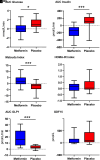Short-term Metformin Protects Against Glucocorticoid-Induced Toxicity in Healthy Individuals: A Randomized, Double-Blind, Placebo-Controlled Trial
- PMID: 39899467
- PMCID: PMC12034906
- DOI: 10.2337/dc24-2039
Short-term Metformin Protects Against Glucocorticoid-Induced Toxicity in Healthy Individuals: A Randomized, Double-Blind, Placebo-Controlled Trial
Abstract
Objective: Glucocorticoids (GCs) are potent anti-inflammatory drugs, but strategies to prevent side effects are lacking. We investigated whether metformin could prevent GC-related toxicity and explored the underlying mechanisms.
Research design and methods: This single-center, randomized, placebo-controlled, double-blind, crossover trial compared metformin with placebo during high-dose GC treatment in 18 lean, healthy, male study participants. The trial was conducted at the University Hospital Basel, Basel, Switzerland. Participants received prednisone 30 mg/day in combination with metformin or placebo for two 7-day periods (1:1 randomization). The primary outcome, change in insulin sensitivity, was assessed using a two-sided paired t test. Before and after each study period, we conducted a mixed-meal tolerance test, blood metabolomics, and RNA sequencing of subcutaneous adipose tissue biopsy specimens.
Results: Metformin improved insulin sensitivity as assessed by the Matsuda index (n = 17; mean change -2.73 ± 3.55 SD for placebo, 2.21 ± 3.95 for metformin; mean difference of change -4.94 [95% CI, -7.24, -2.65]; P < 0.001). Metabolomic and transcriptomic analyses revealed that metformin altered fatty acid flux in the blood and downregulated genes involved in fatty acid synthesis in adipose tissue. Metformin reduced markers of protein breakdown and bone resorption. Furthermore, metformin downregulated genes responsible for AMPK inhibition and affected glucagon-like peptide 1 and bile acid metabolism.
Conclusions: Metformin prevents GC-induced insulin resistance and reduces markers of dyslipidemia, myopathy, and, possibly, bone resorption through AMPK-dependent and -independent pathways.
© 2025 by the American Diabetes Association.
Conflict of interest statement
Figures



Comment in
-
Metformin for Glucocorticoid-Induced Toxicity: Why Not?Diabetes Care. 2025 May 1;48(5):688-690. doi: 10.2337/dci25-0010. Diabetes Care. 2025. PMID: 40273353 No abstract available.
References
-
- Sanpawithayakul K, Korbonits M.. Metabolic complications of glucocorticoids - prevention by metformin. Ann Endocrinol (Paris) 2023;84:483–497 - PubMed
-
- Seelig E, Meyer S, Timper K, et al. . Metformin prevents metabolic side effects during systemic glucocorticoid treatment. Eur J Endocrinol 2017;176:349–358 - PubMed
Publication types
MeSH terms
Substances
Grants and funding
LinkOut - more resources
Full Text Sources
Medical
Miscellaneous

